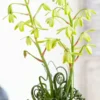NEED SUPPORT WITH YOUR ORDER? Get in touch
Not satisfied with your purchase?
Enter your Order ID on website, and we'll resolve it right away.
Original price was: $59.99.$34.99Current price is: $34.99.
This rare Albuca succulent plant features weird and wonderful spiraling foliage. Each bulb produces unique curls and pendant flowers with a sweet vanilla fragrance. An intriguing conversation piece! Shipped in a 2.5″ pot. Perfect for adding a unique touch to your indoor garden.
Mar 03
Mar 08 - Mar 10
Mar 13 - Mar 17
USDA Hardiness Zone
Soil Type
Sunlight Exposure
Expected Planting Period
Shipping and return policies: Our Alive & Thrive Guarantee covers issues with your plants within the first 30 days. Get in touch with us via email, and our team will review your concerns and, if necessary, provide you with a one-time replacement at no cost.
If you're unsure about your hardiness zone, feel free to reach out to us. Our team will answer your questions and help you find the plants that are truly suitable for your environment, climate, and personal preferences.
The Albuca succulent plant is a captivating botanical specimen that brings a touch of whimsy and intrigue to any indoor space. Its most striking feature is its spiraling foliage, which creates a mesmerizing display. Each bulb produces a different curl pattern, ensuring that every plant is truly unique. These delightful leaves are complemented by delicate pendant flowers that emerge from late winter to spring, boasting charming tones of green and yellow with a soft, sweet vanilla fragrance. This unusual plant is an absolute conversation starter, sure to fascinate and delight all who encounter it.
Originating from the arid landscapes of South Africa, the Albuca is a bulbous plant that gradually multiplies, forming an eye-catching clump over time. The most pronounced and tightest spirals develop under conditions of ample sunlight and dry heat, showcasing nature’s clever adaptation to harsh environments. Despite its exotic appearance, this plant is remarkably easy to grow, thriving in conditions similar to other popular succulents. This makes it an ideal choice for both seasoned plant collectors and beginner plant enthusiasts looking to add a distinctive touch to their indoor garden.
To ensure your Albuca succulent thrives, plant it in moderately fertile, well-drained soil, such as a specialized succulent or cactus potting mix. Provide plenty of bright, direct sunlight, mimicking its native South African habitat. In cooler climates, it’s crucial to protect the plant from excessive winter moisture, which can lead to rot. This sun-loving plant requires watering only when the soil is completely dry to the touch, with increased frequency during its active growing season. With its charming light yellow blooms and straightforward care requirements, the Albuca succulent plant is a must-have addition for any plant lover seeking something truly special.
How often should I water my Albuca succulent plant? Water thoroughly when the soil is dry to the touch, typically every 1-2 weeks, depending on environmental factors like humidity and temperature. Reduce watering significantly during the dormant winter months to prevent root rot.
What kind of sunlight does the Albuca succulent plant need? This plant thrives in bright, direct sunlight. Aim for at least 6 hours of direct sunlight per day to encourage the tightest spirals and promote healthy, vigorous growth. A south-facing window is often ideal.
What is the ideal pot size for the Albuca succulent plant? A 2.5-inch pot is suitable to start for a young plant. As the bulb matures and multiplies, you may need to repot it into a slightly larger container, such as a 4-inch or 6-inch pot, to accommodate its growth and allow for proper root development.
Why are my Albuca succulent plant’s leaves not curling? Insufficient sunlight is the most common reason for the leaves to straighten. Ensure your plant receives adequate bright, direct sunlight. If its current location isn’t providing enough light, adjust its placement accordingly to encourage the characteristic spirals.
Is the Albuca succulent plant toxic to pets? While not considered highly toxic, it’s generally best to keep the plant out of reach of curious pets and small children. Ingestion may cause mild gastrointestinal upset, so it’s always safer to prevent access.
You must be logged in to post a review.

Reviews
There are no reviews yet.